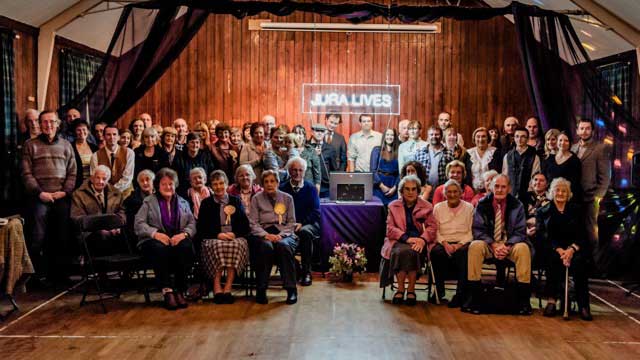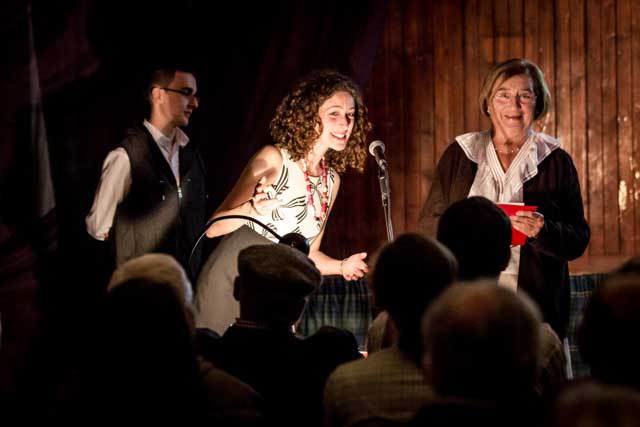This blog post is part of a series for Explore Your Archive.
We’ve been having an interesting time on the Isle of Jura, creating a new archive from scratch. Specifically, a sound archive, full of living memories of the island. The recordings reach back just far enough to graze the First World War and work forwards up to documentary-style capture of ‘the present’ – a day in the Jura Stores, or with the ‘Ferry boys’, preparing for ‘Ardlussa Sports’, or witnessing the renovation of the Lighthouse Station.
Working in this close community, with the sole responsibility of capturing, managing and protecting collective history while being accountable to every individual, I found it very difficult to keep this big job within its bounds! In a population of 200, you end up socialising with the same people you’ve been working with, and a lot is expected from the voluntary sector. The project was hosted by a local charity, with six volunteer Directors to whom I’d to report every month. They’d originally won the funding from the Heritage Lottery and Argyll and the Islands’ LEADER programme 2007-13 (European money for rural areas). Another group of eight volunteers formed my ‘steering group’ who voted on key decisions about the details of design and execution. A third group of 22 volunteers materialised for training in computers and how to transcribe passages from the recordings; resulting scripts were then published in the island’s monthly newsletter, the ‘Jura Jottings’. We had three students mucking in over the summer and an islander at a recording studio on board to produce a CD of some of the collected stories in the last quarter. Altogether, this means that more than 20% of the community have been involved in the endeavour ‘behind the scenes’.

Everyone together
There’s been another interesting dynamic to manage here, besides trying to empower the volunteers, which is the ‘how Jura are you?’ question. Although the answer to that question could be more about how one behaves than one’s background, I myself, privileged to be the appointed ‘project officer’ arrived only five years ago, and some of the people most keen to give their time to the island are also relatively new. If someone has lived here all their lives, or their mother’s family go back nine demonstrable generations, mustn’t they be a superior source? All of the seven landowners who control 96.5% of the island bar one are ‘absentees’, so how qualified are they? Some of them have a long history with the place, and in some cases, made big decisions which have influenced that history. We tried to be as democratic as possible about this, encouraging people from across the spectrum to give interviews, and trying to show everyone’s memories equal respect. In the end, this means that more than 170 speakers can be heard in the archive, in two languages.
It seems to me now that a knowledge of one another’s misfortunes, the exchange of humorous incidents that could have happened ‘only on Jura’, the perspectives on how appropriate the lairds’ or government agencies’ policies have been here, and the various descriptions of different colourful characters through the years – these are the most meaningful aspects of belonging, and also the key to raising the threshold of toleration to the point where a community holds together.
Last month, we had our archive launch party in the village hall. Myself and half a dozen more volunteers prepared nibbles, poured the drams, put up displays, inscribed copies of the project’s souvenir CDs to the contributors, rigged up a ‘reveal’ of the searchable database of recordings for a demonstration, and got the creaking P.A working, so as to present the surprise highlight of the evening, the ‘Jura Oscars’. I had prepared short clips from the sound archive in categories matching the project’s nominal eight themes, then the winner was awarded a unique (read: homemade) rosette and round of applause. The pictures here are from that occasion.

Gavin, Jane and Margaret during the 'Oscars'
If you’re interested, you can hear the nominations for yourself online as part of the ‘Explore Your Archive’ campaign, through the Jura Lives Facebook page. Besides the resident community who were present in force, and seem to have had a good time, we were proud to display goodwill messages and cards from the off-island contributors and 30 other super-supportive archive services and professionals.
Having never had an archivist on Jura, especially not a digital archivist, and personally, having not engaged in ‘oral history’ before, the learning curve has been huge. The inclusiveness and generosity shown towards us by the archives sector has meant a lot. We couldn’t have done what we’ve done without picking the mighty brains of the British Library’s oral history department, or without the School of Scottish Studies and Tobar an Dualchais staff sharing their experience and methods. We’ve also had really great support from the Scottish Council on Archives, ‘Scran’ (the digital resources arm of the Royal Commission on Ancient and Historic Monuments, Scotland) and the ‘Explore your Archives’ campaign team.
So, we’ve started now; the citizens of Jura have got more used to their memories being collected, and have gained skills. There have been some public successes, such as the Primary School’s exhibition about the recordings cafe that they ran travelling to Kelvingrove art gallery and museum in Glasgow. We’ve evolved a great system for organising and accessing the audio. And we’re hoping not to stop there – not just because, as my husband teases me, I will personally be tied to the Jura Lives collection for the rest of my life, but – through the creation of a follow-on project to bring out more of the wonderful content. Keep an eye on juradevelopment.co.uk/oral-history-project/ to see how we go on from here….
—————————————————————————————————————————-
This week sees the launch of Explore Your Archive, a new campaign for archives, which highlights the value of local, university, business, specialist, private and national archives. Archive services across England, Wales, Scotland, Northern Ireland and Ireland are sharing inspiring, surprising and enticing stories from their collections. Have a look at the website to find an event near you and be inspired to Explore Your Archive.
Reading the above you are clearly continuing to do a grand job. Hoping to return to Jura next spring in our camper van in which you interviewed me about Jura in the 1960s.
Best wishes,
David